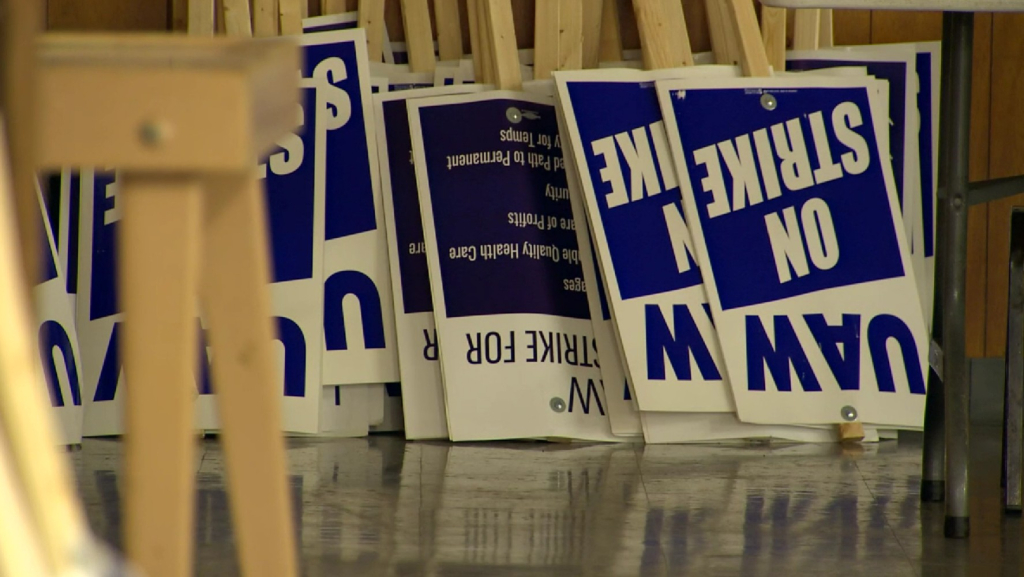
The president of the United Auto Workers said Friday the union will expand its strike against major automakers by walking out of 38 General Motors and Stellantis facilities in 20 states.
The UAW on Friday targeted distribution centers, not production plants. That includes workers at the Stellantis Dallas Parts Distribution Center in Carrollton and the GM Fort Worth Parts and Distribution Center in Roanoke.
The three strikes that began at plants Ford, GM and Stellantis plants one week ago will go on, the union said.
Ford was spared additional strikes because the company has met some of the union’s demands during negotiations over the past week, said UAW President Shawn Fain.
The union is pointing to the companies’ huge recent profits as it seeks wage increases of 36% over four years. The companies have offered a little over half that amount. The UAW has other demands, including a 32-hour work week for 40 hours of pay and a restoration of traditional pension plans for newer workers.
The companies say they can’t afford to meet the union’s demands because they need to invest profits in a costly transition from gas-powered cars to electric vehicles.
The UAW’s contract with the automakers expired at midnight on Sept. 14, and workers walked out of a Ford assembly plant near Detroit, a GM factory in Wentzville, Missouri, and a Jeep plant run by Stellantis in Toledo, Ohio. The initial strike has involved about 13,000 of the union’s 146,000 members.
Fain said earlier this week he would call on workers at more plants to strike unless there was significant progress in contract negotiations with the carmakers. Bargaining continued Thursday, although neither side reported any breakthroughs, and they remained far apart on wage increases.
The strike until Friday had involved fewer than 13,000 of the union’s 146,000 members. The companies have laid off a few thousand more, saying some factories are running short on parts because of the strike.
Still, the impact is not yet being felt on car lots around the country – it will probably take a few weeks before the strike causes a significant shortage of new vehicles, according to analysts. Prices could rise even sooner, however, if the prospect of a prolonged strike triggers panic buying.
The union is seeking pay raises of 36% over four years, an end to lower pay scales for new workers, and most boldly, a 32-hour work week for 40 hours of pay. The car companies say they can’t afford the union’s demands despite huge profits because they need to invest in the transformation to electric vehicles.
One week ago, workers went on strike a week ago at three assembly plants — a Ford factory near Detroit, a GM plant outside St. Louis, and a Jeep plant owned by Stellantis in Toledo, Ohio.
The Detroit News reported Thursday that a spokesman for Fain wrote on a private group chat on X, formerly Twitter, that union negotiators aimed to inflict “recurring reputations damage and operational chaos” on the carmakers, and “if we can keep them wounded for months they don’t know what to do.”
Ford and GM seized on the messages as a sign of bad faith by the UAW.
“It’s now clear that the UAW leadership has always intended to cause months-long disruption, regardless of the harm it causes to its members and their communities,” GM said in a statement.
Ford spokesman Mark Truby called the messages “disappointing, to say the least, given what is at stake for our employees, the companies and this region.”
The UAW spokesman, Jonah Furman, did not confirm writing the messages, which were linked to the same picture as his X account, and called them “private messages” that “you shouldn’t have,” the newspaper reported.




